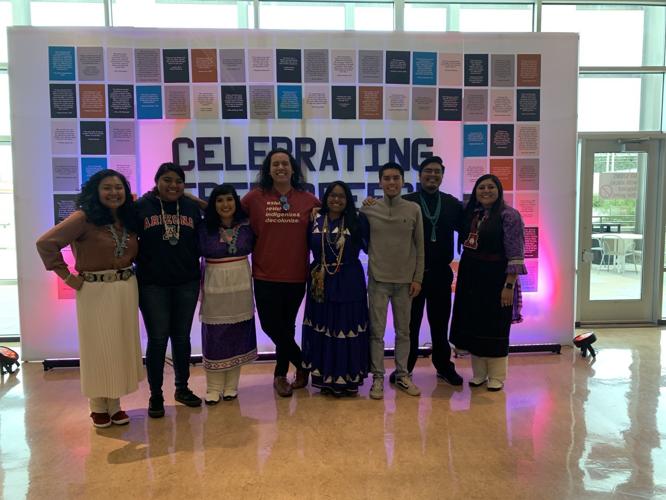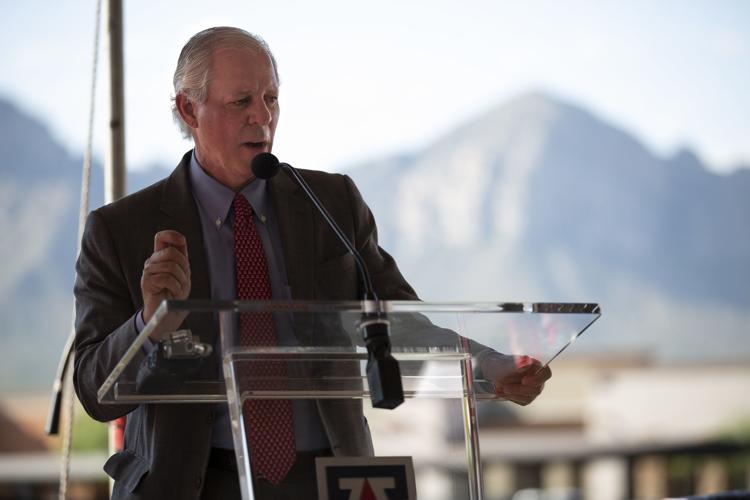Native American students at the UA gathered at the Arizona Board of Regents meeting Thursday to protest what they called a lack of support for Native students at the school.
Nine students stood in front of the regents during its “call to the audience” portion of the meeting and read personal statements that raised concerns about institutionalized support for Native American students, the recruitment of students and staff from marginalized groups, and the creation of more supportive programs and services.
“It’s a miracle that indigenous people exist,” said third year doctoral student Amanda Cheromiah. “And it’s a miracle when one Native American student enrolls in college, because educational institutions are not designed for us.”
Earlier this semester, a group of students who call themselves the Voices of Indigenous Concerns in Education, or VOICE, issued a letter describing an interaction with President Robert. C. Robbins in which they said he made culturally insensitive comments.
According to the group, Robbins told students during a class on Oct. 3 that he had taken a DNA test to prove his Cherokee ancestry, and when the test results came back negative, he said he planned to take another test to double check “because of his ‘very high cheekbones.’”
Cheromiah said the students have had several meetings with university officials, including Robbins, since this incident and they have been discussing and listening to the students’ concerns. The students chose to speak before ABOR, however, in order to ensure that these conversations continue and that they lead to systemic change.
“First, we wanted to let the board know that we forgave President Robbins,” Cheromiah said later. “Secondly, we wanted to let them know where we’re at. And lastly, we wanted to proclaim our indigenous identities because we have the ability to speak and to share. It was very nerve-wracking, but I think they’ll remember something from our stories.”
Students from the Associated Students of the University of Arizona also took advantage of ABOR’s open-comment period, bringing up concerns such as food insecurity among students, sexual assault on campus, the prioritization of marginalized students and mental health resources. “U of A can do so much better. ABOR can do so much better,” said ASUA President Sydney Hess.
Capital Development
The regents also approved the UA’s Capital Development Plan for fiscal year 2020, which includes three new projects totaling $86 million and two revised projects totaling $200 million.
Among its new projects, the UA plans to make renovations to its historic Chemistry Building, which was originally constructed in 1936. Their proposal includes the addition of collaborative learning spaces on the first and second floors, as well as offices for the Office of General Education and the Department of Chemistry and Biochemistry.
The UA will address deferred maintenance, building code upgrades and the accessibility of the building. The total cost of the project will be $42 million.
The Board of Regents also approved the development of a new building for the Center for Integrative Medicine, which will be at East Mabel Street and North Vine Avenue. With a total project budget of $20 million, construction on the center will begin in the fall 2020 and is slated to finish in the fall 2021.
The UA also plans to create a Facilities Management Relocation and Consolidation Facility with a total project budget of $24 million. According to the proposal, facilities management services are currently scattered across 20 location on campus. Also, the department’s main facility now will have to make way for a new electric substation that is to be built to serve the UA, Banner-University Medical Center and the community.
Lastly, the board approved revisions to projects for the Applied Research Building and the Grand Challenges Research Building, totaling $101 million and $99 million, respectively.
The new Applied Research Building, which will be next to the Aerospace and Mechanical Engineering building, will be home to several interdisciplinary research labs and will house the UA’s Applied Research Corp.
The new Grand Challenges Research Building, which will be between the UA’s Main Library and McKale Memorial Center, will be a six-story research facility that aims to bring university scientists together in a collaborative space.
contracts approved
The regents voted unanimously to approve a one-year contract extension for Robbins through 2022.
The terms of his contract did not change, but Robbins has a built-in 3.5% annual raise that goes into effect every Sept. 1. This fiscal year, Robbins’ base salary is roughly $698,625.
The regents also approved the contract extensions for Arizona State University President Michael Crow, through June 30, 2024, and Northern Arizona University President Rita Cheng, through June 30, 2022. In addition, the regents approved a 3.5% raise for their executive director, John Arnold.
Use and sale of vaping and tobacco products
Arizona Regent Fred DuVal proposed a change to the board’s code-of-conduct policies regarding the use and sale of vaping and tobacco products on university property.
According to DuVal, there are more than 25 stores that sell tobacco products within three miles of Arizona universities.
“Vaping has been intentionally and effectively marketed to kids and students around the country,” he said. “They go to where the customer is, and so they’ve concentrated around our campuses. And that’s because that’s where the market is growing.”
While the use of tobacco and vaping products is prohibited on all Arizona campuses, the sale of them on university property is not. The proposal also includes banning the sale of these products on all properties that the universities lease to third-party vendors.
“It makes access to the product simply more inconvenient,” said DuVal about the proposal. “We need to send a very strong statement that vaping and tobacco is a stupid choice.”
The regents will vote on the approval of this proposal at their next meeting in February.





